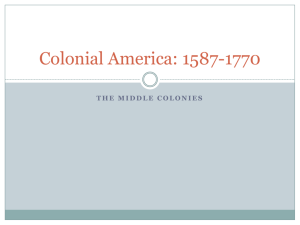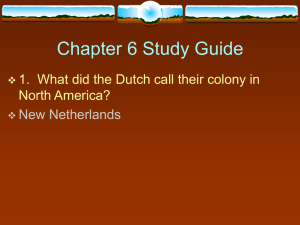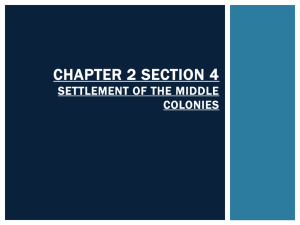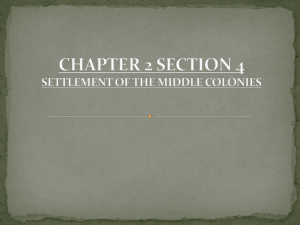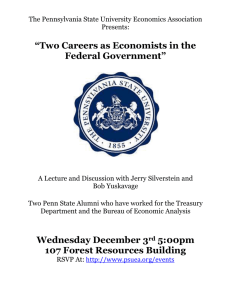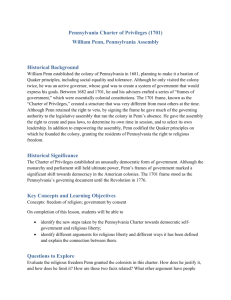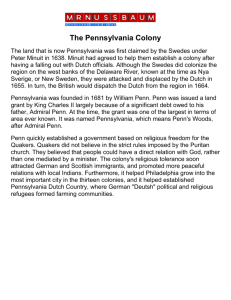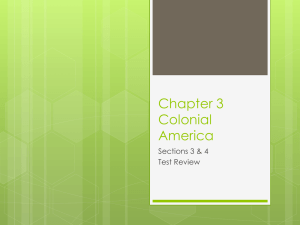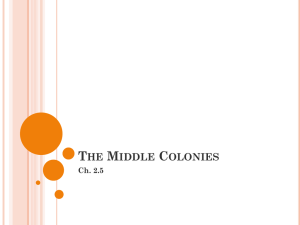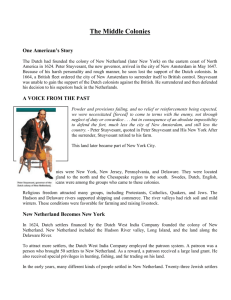CHAPTER 2 SECTION 4 SETTLEMENT OF THE MIDDLE COLONIES
advertisement
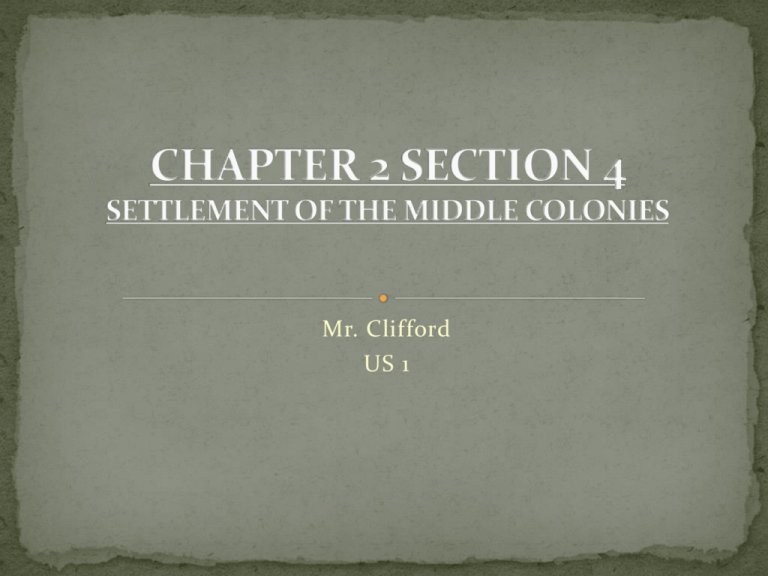
Mr. Clifford US 1 The Dutch settle New Netherland; English Quakers led by William Penn settle Pennsylvania. The principles of tolerance and equality promoted in the Quaker settlement remain fundamental values in America. William Penn New Netherland Proprietor Quakers ONE AMERICAN’S STORY “For matters of liberty and privilege, I propose that which is extraordinary, and [I intend] to leave myself and successors no power for doing mischief, [in order] that the will of one man may not hinder the good of a whole country; but to publish those things now and here, as matters stand, would not be wise. . . . ” —William Penn - quoted in A New World How did William Penn’s father enable him to establish the colony of Pennsylvania? Why did Penn want to establish a colonial government run on Quaker principles? How was Penn’s colonial government different than Jamestown & Massachusetts Bay Colony? Diverse Colony Dutch settled along Hudson river & established a thriving fur trade and trading post in present day Albany. 1621: Dutch government gave permission to Dutch West India Company to colonize ‘New Netherlands’ & expand the fur trade. New Netherlands included (New York & New Jersey) New Amsterdam (New York City) was named capital of New Netherlands. https://www.youtube.com/watch?v=7AICWljujdg&list=PLU _xjG_HyOyCS-kMWNb9Yzr4WtD7odcqI Dutch West India Company encouraged settlers from Europe to settle in New Netherlands. Dutch, Germans, Scandinavians, Africans (free & enslaved), and made up colony. All religions were welcome: Protestants, Catholics, Jews, Muslims New Netherlands became known as ‘Great Confusion of Tongues’ because of its diverse population. Dutch & Native Americans traded and got along well. England believed that the Dutch had created a ‘Dutch Wedge’ between New England & MidAtlantic colonies. The Duke of York was ordered by the King of England to invade colony and drive Dutch out. Most settlers refused to fight against the British so Stuyvesant reluctantly signed the colony over the James ‘Duke of York’- who eventually became King James II. ‘Duke of York’ renamed colony New York and gave friends lands west of the Hudson which was named New Jersey. King Charles II owed money to his supporters in England. (e.g. William Penn’s father was owed 16,000 pounds) Instead of monetary payment, King Charles II gave William Penn, who was a Quaker, a large property in America and requested that William name the colony after his father: Pennsylvania. http://www.youtube.com/watch?v=LewnnInReP8 What’s a Quaker? Quakers: believed that God’s ‘inner light’ shined on everyone. Services were held without formal ministers People could speak during the service if the ‘Holy Spirit’ moved them Quakers dressed in plain clothes Refused to defer to persons of ‘rank’ They opposed war & refused to serve in the British military They were persecuted in Britain for their religious views. Quakers William Penn wanted to create a society based on Quaker ideals. Penn’s ‘Holy Experiment’ was to create a colony that had absolutely NO LANDOWNING ARISTOCRACY. Every adult male received 50 acres of land when coming to Pennsylvania All men could vote Government would be a ‘representative assembly’ Representative Assembly supported ‘religious freedom’. Capital of Pennsylvania was called Philadelphia – ‘The City of Brotherly Love’ Penn believed - people approached in friendship would respond in friendship. Penn regulated trade between the Native Americans and settlers to ensure trade was fair & honest. Penn provided a court comprised of colonists & Native Americans to settle differences Relationship between settlers & Native Americans was peaceful for 50 years. Penn needed to attract settlers (farmers, builders, traders) to ensure the colony would thrive. Penn advertised throughout Western Europe. Signs written in German, French, & Dutch were printed in newspapers. Settlers came in numbers, including thousands of Germans who brought with them craft skills, and farming techniques that helped the colony thrive. Quakers in Pennsylvania were heavily outnumbered and slavery was eventually brought to the colony. Penn’s principles of equality, cooperation, and religious tolerance would eventually become the fundamental values of the new American nation. Colony Founded Economic Activity Massachusetts Plymouth 1620 / Mass. Bay 1630 New Hampshire 1623 Shipbuilding, shipping, fishing, lumber, rum, meat products Ship masts, lumber, fishing, trade Connecticut 1636 Shipping, livestock, foodstuffs Rhode Island 1636 Rum, iron foundries, shipbuilding, snuff, livestock New York 1625 Furs, wheat, glass, shoes, livestock, shipping, shipbuilding, rum, beer, snuff Delaware 1638 Trade, foodstuffs New Jersey 1664 Trade, foodstuffs, copper Pennsylvania 1681 Flour, foodstuffs, paper, iron, wheat, flax, shipbuilding Virginia 1607 Tobacco, wheat, cattle, iron Maryland 1632 Tobacco, wheat, snuff North Carolina 1663 Naval supplies, tobacco, furs South Carolina 1663 Rice, indigo, silk Georgia 1732 Indigo, rice, naval supplies, lumber
